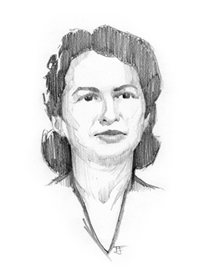A Heart For Internationals
At first glance, Dr. Christine Fall, BA '24, MA '34, might have appeared out of place on the faculty of a college in Asia; after all, her academic interests centered on another continent.
After earning her bachelor's and master's degrees in English from Baylor and a doctorate from the University of Texas, Fall began teaching English at Baylor in 1939. In graduate school, she took what would be the first of many research trips to England, helping her eventually become a noted authority on the poetry of Alfred, Lord Tennyson. In the process she became close friends with members of the Tennyson family, even hosting them at her home in Waco on occasion and co-authoring a critical study of Tennyson's work with the poet's grandson.
Colleagues remember Fall as a woman of strong opinions who was nevertheless gracious, reserved and a bit old-fashioned. In the classroom, she gained a reputation as a firm but fair professor who demanded respect.
"She was a rigorous teacher," says Patricia Howard, BA '53, MA '72, who studied under Fall as a student and later joined her as an English faculty member at Baylor. "If you were a serious person who was there to learn, you liked her very much. If you just wanted an easy English class, hers was not the one to take. The best students were attracted to her."
Besides adoring English literature, Fall had a place in her heart for international students. After troops from the Soviet Union invaded Hungary in November 1956 to quell a violent revolt against the pro-Soviet Communist government, thousands of students fled the country for the safety of the United States. Three of those young Hungarian refugees were brought to Baylor in February 1957 with money raised by the student body.
Having already completed a study of the latest rapid learning methods of modern linguistics, Fall volunteered to teach the three Hungarian refugees how to speak and write English.
Later that same year, Fall was given another chance to help students from overseas. Southern Baptists in the United States committed themselves to making sure that the newly established Hong Kong Baptist College thrived. For its part, Baylor agreed to provide scholarship aid to allow Hong Kong Baptist students to study in Waco, and also agreed to allow Baylor faculty to teach temporarily at the college.
"It is simply Baylor's way of extending a helping hand to a sister institution in the interest of promoting better understanding between our people," Baylor executive vice president Paul Geren said at the time. "Even more fundamental, it is in keeping with the Christian missionary outreach of Baylor."
Fall was the second member of Baylor's faculty selected to teach in Hong Kong. She spent the 1957-58 academic year there, helping the fledgling school organize its foreign language and literature department.
"She was the only woman teaching on the faculty there at the time, and there were three or four male Chinese professors who at first made it tough for her to be accepted," Howard says. "They made it difficult for new people, but she ended up earning the respect of those men."
Fall returned to Baylor in 1958 and continued to help international students adjust to life in America.
"She sometimes invited us to her home to have tea or cake," says Dr. Clement Young, MA '61. "She treated us as if we were her own children. She loved to see us."
"She gave us a lot of help, taught us a lot about the United States and was our guardian while we were at Baylor," adds Dr. Daniel Tse, BA '60, MS '62.
Fall remained a member of the faculty until her retirement in 1974; she passed away 11 years later. Since 1976, the Baylor English Department has annually given the "Christine Fall Award" to its teaching assistant of the year.
